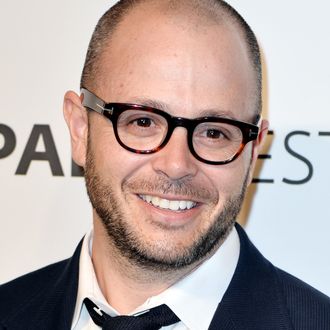
Ahead of LeftoversÔÇÖ second-season premiere this weekend, showrunner Damon Lindelof participated in an extensive ÔÇö very extensive ÔÇö set of interviews with HitFixÔÇÖs Alan Sepinwall. The candid discussion encompasses the divisive HBO showÔÇÖs beginnings, its torturous progression, and, of course, a little bit of what you can expect in season two. Notably, though, the conversation spends time grappling with why and how the show, which deals with the EarthÔÇÖs sudden disappearance of 140 million people, might have become depressing to some ÔÇö and how that criticism affected Lindelof (and vice versa):
I was really depressed while I was writing the first season of the show. And I donÔÇÖt know if itÔÇÖs the chicken or the egg scenario, which is, did the show make me depressed or was I depressed and made the show depressing? But I will say that what I locked in on and particularly when I started talking with (pilot director) Pete Berg the first time, he said, ÔÇ£I think about Sandy Hook and Newtown when I read this.ÔÇØ And I was like, ÔÇ£Oh, what?ÔÇØ
Berg noted that the script was similarly blindsiding, like the news of those tragedies. To further prep the script, the duo actually visited Newtown:
The entire town felt just really sad and tragic, and there were ribbons everywhere, and they had built this amazing lighthouse monument that was covered in messages. And then when we came, there were all these people standing around with their cell phones taking pictures of this stuff. And I felt really icky for being there ÔÇö like I didnÔÇÖt deserve to be there. I felt like a looky lou, but the tragedy really permeated. I have to check the timing, but I believe they had just voted to raze the school. Then they were going to build a new school on the same site.┬á
So they were engaging in this almost primitive religious behavior of, ÔÇ£WeÔÇÖre just going to destroy this structure and clear out that energy and then rebuild again.ÔÇØ And all those things just became embedded in the show at that point.┬áAnd so the idea of sadness and grief and loss and a pervasive sense of PTSD and insanity started to kind of seep into my consciousness and feel really authentic. Just, ÔÇ£What does the emotional apocalypse feel like?ÔÇØ ÔǪ If you try to describe The Leftovers to someone, it sounds ridiculous.┬á But is there a way to emotionally ground it, so that if you watch The Leftovers with the sound down, you just think that you were watching a show with weird people walking around dressed in white.┬á YouÔÇÖd have no sense whatsoever that the Sudden Departure happened, but you would have a sense of what that world felt like emotionally. And that became the ambition, right or wrong.
The depressing nature of the show, Lindelof, Sepinwall, and Berg think, might be rooted in the showÔÇÖs parallel to our world:
I do think that this event has a sort of cosmic supernaturality around it, but I do feel like wherever you lie on the faith spectrum, your faith also gets shaken when you see these things happen, because it completely and total decimates your construct for faith.┬á So if someone walks into a church, sits in a prayer group, stays for an hour so he gets to know the people in that group, and then takes out a gun and shoots them all, theyÔÇÖre some sort of despicable racist.┬á And then you just go, ÔÇ£That breaks the fundamental rules of my God construct.┬á ThatÔÇÖs not allowed to happen.ÔÇØ ÔǪ [I]tÔÇÖs easily relatable because on any given week you can turn on the news and just be like, ÔÇ£Okay, that happened.ÔÇØ
You can read the whole interview, which also discusses world-building, the trouble of first seasons, and LostÔÇÖs mystery engine, here.

